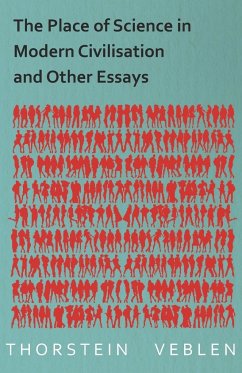The Place of Science in Modern Civilisation and Other Essays' was first published in 1919. It's author, Thorstein Veblen, was the son of Norwegian American immigrants. He grew up to become a prominent economist and sociologist, producing many books and articles, and is often remembered for his use evolutionary theory to develop a 20th century theory of economics. This collection includes essays with such title as 'The Limitations of Marginal Utility', 'On the Nature of Capital', 'An Early experiment in Trusts', and many more. We are republishing this work with a brand new introductory biography.
Bitte wählen Sie Ihr Anliegen aus.
Rechnungen
Retourenschein anfordern
Bestellstatus
Storno









